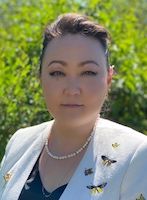“Cursed lives” and the crisis of values in Tuvan society
DOI:
https://doi.org/10.25178/nit.2022.1.18Keywords:
Shamanism; Shamanism in Tuva; Tuva; Tuvans; review article; religious revivalAbstract
This is a review article focused on the monograph authored by the anthropologist Konstantinos Zorbas and published under the title “Shamanic Dialogues with the Invisible Dark in Tuva, Siberia. The Cursed Lives” in 2021 by Cambridge Scholar Publishing. The book is devoted to a special type of practice offered by the shamans of Kyzyl as part of their rituals — namely, removing curses invoked (as it is believed) by others, often through the mediation of shamans, in order to harm someone’s health, welfare, etc.
Zorbas’ book, originally published in English, focuses on the part of the sociocultural life of the Tuvan society which is little-known in Russian Tuvan studies. The authors of the review article discuss three ideas which they consider most interesting. Firstly, Zorbas states that the practice of shamanic curses spread in Tuva in the wake of the social and economic turmoil of the 1990s, with its mass disappointment, group conflicts and total mistrust. The authors of the review believe that these practices lay in the lower part of archaization trends in the society undergoing a crisis of social transformation.
Secondly, the authors follow Zorbas’ analysis of the value crisis and the rise of profit-seeking in society, of Shamanism as a kind of “ontological government”, of Zorbas’ observation of shamans’ clients, and also why some Russians living in the region also share some of the Shamanist ideas.
Thirdly, it is of special importance that a study of Shamanism’s dark practices was carried out by an outsider scholar. For mainstream scholars, this topic often remains taboo, since they cannot completely discard their own ethnocultural and religious identity, as well as some cultural orientations and religious prohibitions.
References
Baidullaeva, R. Sh. and Ainabekova, N. B. (2018) Blagopozhelaniia i prokliatiia kak iazykovaia universaliia (kontrastivno-pragmaticheskii analiz) [Good wishes and imprecations as a linguistic universal: the contrastive-pragmatic analysis]. Vestnik nauki Iuzhnogo Kazakhstana, no. 4(4), pp. 225–231. (In Russ.).
Berezovich, E. L. and Surikova, O. D. (2017) K rekonstruktsii leksicheskogo sostava russkikh narodnykh prokliatii: obshchaia kharakteristika predikata prokliatiia [Reconstructing the vocabulary of Russian popular imprecations: general characteristics of the imprecation predicate]. Jezikoslovni zapiski, no. 2(23), pp. 67–81. (In Russ.).
Vinogradova, L. N. (2005) Formuly ugroz i prokliatii v slavianskikh zagovorakh [Formulas of threats and curses in Slavic charms]. In: Zagovornyi tekst: Genezis i struktura [Texts of charms: genesis and structure] / editorial board: L. G. Nevskaia, T. N. Sveshnikova (ed.) and V. N. Toporov. Moscow, Indrik. 520 p. Pp. 425–440. (In Russ.).
Vinogradova, L. N. and Sedakova, I. A. (2009) Prokliatie [Imprecation]. In: Slavianskie drevnosti. Etnolingvisticheskii slovar' [Slavic antiquities: An ethnolinguistic dictionary] : in 5 vols. / ed. by N. I. Tolstoi. Moscow, Mezhdunarodnye otnosheniia. Vol. 4. 656 p. Pp. 286–296. (In Russ.).
Dashkovskii, P. K., Shershneva, E. A., Bicheldei, U. P. and Mongush, A. V. (2021) Religioznaia situatsiia v Respublike Tyva (po rezul'tatam sotsiologicheskogo issledovaniia) [Religious situation in the Republic of Tuva: based on the results of a sociological study)]. New Research of Tuva, no. 2, pp. 18–34 (In Russ.). DOI: https://www.doi.org/10.25178/nit.2021.2.2
Lamazhaa, Ch. K. (2013) Arkhaizatsiia obshchestva. Tuvinskii fenomen [Archaization of the society. Tuvan phenomenon]. Moscow, Knizhnyi dom «Librokom». 272 p. (In Russ.)
Lamazhaa, Ch. K. (2021) Ocherki sovremennoi tuvinskoi kul'tury [Essays on modern Tuvan culture]. St. Petersburg, Nestor-Istoriia. 192 p. (In Russ.)
Lamazhaa, Ch. K., Bicheldei, U. P. and Mongush, A. V. (2020) Tuvinskoe buddiiskoe palomnichestvo: ot traditsii k vere [Tuvan Buddhist pilgrimage: from tradition to faith]. New Research of Tuva, no. 4, pp. 135-155. (In Russ.). DOI: www.doi.org/10.25178/nit.2020.4.10
Medvedeva, D. V. and Deputatova, N. A. (2019) Rechevoi akt prokliatiia v angliiskom iazyke [The speech act of cursing in English]. In: Terra linguae. Vol. 5. Kazan', Kazan University Press. 224 p. Pp. 185–189. (In Russ.)
Humphrey, C. (2010) Postsovetskie transformatsii v aziatskoi chasti Rossii. Antropologicheskie ocherki [Post-Soviet transformations in the Asian part of Russia. Anthropological essays]. Transl. from Eng. Moscow, Natalis. 382 p. (In Russ.)
Kharitonova, V. I. (2006) Feniks iz pepla? Sibirskii shamanizm na rubezhe tysiacheletii [A Phoenix from the ashes? Siberian shamanism at the turn of the millennium.]. Moscow, Nauka. 372 p. (In Russ.).
Kharitonova, V. I. (2018b) Tuvinskii (neo)shamanizm kak kul'tovaia i tselitel'skaia praktika v sovremennom mire [Tuvan (neo)Shamanism as a religious and healing practice in contemporary world]. New Research of Tuva, no. 4, pp. 47–76. (In Russ.) DOI: https://doi.org/10.25178/nit.2018.4.3
Kharitonova, V. I. (2018a) Narodnaia i traditsionnaia meditsina: vozmozhnosti integratsii meditsinskikh sistem, praktik i metodov v usloviiakh sovremennoi Tuvy [Folk and traditional medicine: On the possibility of integrating medical systems, practices and methods in contemporary Tuva]. New Research of Tuva, no. 4, pp. 4–29. (In Russ.) DOI: https://doi.org/10.25178/nit.2018.4.1
Blank, Sh. H. (1950–1951) The Curse, Blasphemy, the Spell, and the Oath. Hebrew Union College Annual, vol. 23, no. 1, pp. 73–95.
Fensham, F. Ch. (1962) Salt as Curse in the Old Testament and the Ancient Near East. The Biblical Archaeologist, vol. 25, no. 2, pp. 48–50.
Hann Ch., Humphrey C. and Verdery K. (2001) Introduction. C. Hann (ed.) Postsocialism: Ideals, Ideologies and Practices in Eurasia. London, Routledge. 360 p. Pp. 1–28. DOI: https://doi.org/10.4324/9780203428115
Humphrey, K. (1989) Perestroika and the pastoralism: The Example of Mongun-Taiga in Tuva ASSR. Anthropology Today, June, no. 5, pp. 6–10. DOI: https://doi.org/10.2307/3032697
Jay, T. (2000) Why We Curse. A neuro-psycho-social theory of speech. Massachusetts College of Liberal Arts, North Adams, Massachusetts. 328 p.
Lamazhaa, Ch. (2018) Indigenous Methodology and Research of Tuvan Culture. Sibirica, vol. 17, issue 3, pp. 68–82. DOI: https://doi.org/10.3167/sib.2018.170307
Temirgazina, Z. (2013) Effective Communicative Strategies and Tactics in Verbal Aggression Situations. World Applied Sciences Journal, no 24(6), pp. 822–825.
Zorbas, K. (2015) The Origins and Reinvention of Shamanic Retaliation in a Siberian City. Journal of Anthropological Research, vol. 71, no. 3, pp. 401–422. DOI: https://doi.org/10.3998/jar.0521004.0071.304
Zorbas, K. (2021) Shamanic Dialogues with the Invisible Dark in Tuva, Siberia. The Cursed Lives. Cambridge Scholar Publishing. 125 p.
Published
How to Cite
For citation:
Lamazhaa Ch. K. and Bakhtikireeva U. M. «Prokliatye zhizni» i tsennostnyi krizis v tuvinskom obshchestve [“Cursed lives” and the crisis of values in Tuvan society]. New Research of Tuva, 2022, no. 1, pp. 266-275. (In Russ.). DOI: https://www.doi.org/10.25178/nit.2022.1.18
Issue
Section

This work is licensed under a Creative Commons Attribution-NonCommercial 4.0 International License.

Author(s) license holder(s) grant rights for their work to the journal (grantee of a license) under the simple non-exclusive open license in accordance with Art. 1286.1 «Open license for a research work, work of literature or fine arts», Civil Code of the Russian Federation.
New Research of Tuva publishes articles under the Creative Commons Attribution-NonCommercial license (CC BY-NC).
Since it is an open license, author(s) reserve the right to upload the article to their institutional repository, submit it to another journal (if it allows republications), or republish it on their own website (in full, or in part).
However, several conditions apply here:
a) The republished version must always contain the name(s) and affiliation(s) of the author(s), the original title and the hyperlink to the original version on the New Research of Tuva website;
b) It must be in open access, free of charge, and no category of readers must be in any way whatsoever advantaged over general readership.
c) should the contribution be submitted elsewhere by its author(s) without substantial modification (30% or more of original text unchanged), the body of the article should contain a disclaimer that the original version was published in New Research of Tuva (with a link to the respective page)
The CC-BY-NC is a non-revocable license which applies worldwide and lasts for the duration of the work’s copyright.










